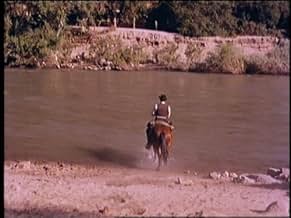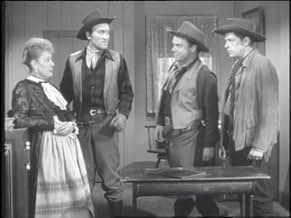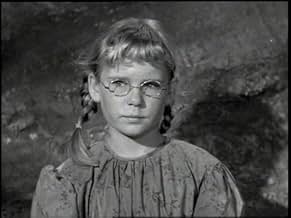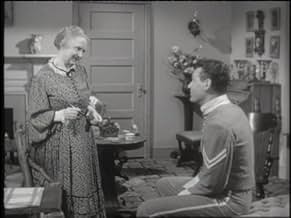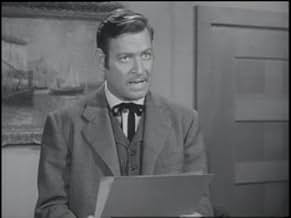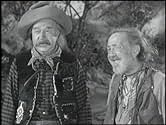IMDb रेटिंग
7.7/10
3.1 हज़ार
आपकी रेटिंग
अपनी भाषा में प्लॉट जोड़ेंThe adventures of the masked Texas Ranger and his Native American partner.The adventures of the masked Texas Ranger and his Native American partner.The adventures of the masked Texas Ranger and his Native American partner.
- 2 प्राइमटाइम एमी के लिए नामांकित
- 3 कुल नामांकन
एपिसोड ब्राउज़ करें
फ़ीचर्ड समीक्षाएं
The 221 episodes of "The Lone Ranger" were originally broadcast on ABC from 1949 to 1957; and then for many years they played in local syndication. For most of the original broadcast years the series was ABC's most watched piece of programming.
The new DVD set from Pop Flix contains the first 16 episodes (15 Sept-29 Dec 1949) and for some reason unknown to me episode 22 from the fifth season, for a total of 17 episodes (the same 17 available on last year's Mill Creek Entertainment release so these are probably in the public domain). These sets pretty much render "The Legend of the Lone Ranger" movie superfluous as all three episodes that were combined in 1952 to form the movie are included in these releases.
The early episodes hark back to radio as there is considerably more voice-over narration used as an introduction and to introduce key plot moments.
The series itself was pure kiddie western with clear-cut good and evil distinctions and no romance. The title character (played by Clayton Moore) started out Texas Ranger John Reid. The first three episodes provide the background for his transformation to Lone Ranger status, his partnering with the Indian Tonto (Jay Silverheels), and the taming of his horse "Silver".
There is an unambiguous code of positive morality infusing each episode. The Lone Ranger is totally good but he adopts the guise of evil. While a masked man in the west was normally feared by the good citizens and an Indian was distrusted, the Lone Ranger is feared by those who would do evil. One persistent theme is that when the Lone Ranger and Tonto first encounter an average citizen they are greeted with suspicion, and by the end of the episode the citizen has been convinced of their value. The trademark ending was a secondary character asking the question: "who was that masked man?".
To really enjoy the series you must accept it for the simplistic morality tale it was intended to be. If you don't take it seriously and keep wishing for some self-reflexive campy parody elements you will only get frustrated.
Then again, what do I know? I'm only a child.
The new DVD set from Pop Flix contains the first 16 episodes (15 Sept-29 Dec 1949) and for some reason unknown to me episode 22 from the fifth season, for a total of 17 episodes (the same 17 available on last year's Mill Creek Entertainment release so these are probably in the public domain). These sets pretty much render "The Legend of the Lone Ranger" movie superfluous as all three episodes that were combined in 1952 to form the movie are included in these releases.
The early episodes hark back to radio as there is considerably more voice-over narration used as an introduction and to introduce key plot moments.
The series itself was pure kiddie western with clear-cut good and evil distinctions and no romance. The title character (played by Clayton Moore) started out Texas Ranger John Reid. The first three episodes provide the background for his transformation to Lone Ranger status, his partnering with the Indian Tonto (Jay Silverheels), and the taming of his horse "Silver".
There is an unambiguous code of positive morality infusing each episode. The Lone Ranger is totally good but he adopts the guise of evil. While a masked man in the west was normally feared by the good citizens and an Indian was distrusted, the Lone Ranger is feared by those who would do evil. One persistent theme is that when the Lone Ranger and Tonto first encounter an average citizen they are greeted with suspicion, and by the end of the episode the citizen has been convinced of their value. The trademark ending was a secondary character asking the question: "who was that masked man?".
To really enjoy the series you must accept it for the simplistic morality tale it was intended to be. If you don't take it seriously and keep wishing for some self-reflexive campy parody elements you will only get frustrated.
Then again, what do I know? I'm only a child.
Seriously, while I don't want to be unfair to John Hart, it's impossible for me to watch any of his episodes and not miss Clayton Moore, and I mean miss Clayton Moore badly. It's hard to believe that producer George Trendle really thought he could put anyone in the mask and the public wouldn't know the difference. And the difference was enormous. Clayton Moore played the Lone Ranger with great style and unquestionable sincerity. To me, Clayton Moore' Lone Ranger and William Boyd's Hopalong Cassidy were the best of the early television western heroes. They hold a special place in the hearts of many baby boomers, myself included.
Looking back on `The Lone Ranger' TV series as an adult is a strange experience. Watching episodes through an adult's eyes alerted me to flaws I didn't notice when I was a kid: the acting was sometimes on the B-movie level. The stories tended to be repetitive and simplistic. The Native Americans were generally played by Caucasian or Hispanic or Italian-American actors. The `outdoor' exteriors in a lot of episodes were obviously indoor sets. But there is a spirit and an energy to the show that you can't deny.
Most of the credit for the show's success goes to its leads, Clayton Moore and Jay Silverheels. They became the Lone Ranger and Tonto, lived the roles as no other actors before or since. Moore, in particular, knew the Ranger was presented as a hero and an example to children, and from what I've heard, he tried his best to live up to that. He made the Ranger a fair and just man, someone who didn't judge, who gave people the benefit of the doubt, but acted correctly when the time was right. He used violence only as a last resort. He was a symbol of honor and integrity, the kind of person I wish I could be.
As for Tonto... It occurs to me nowadays how great an actor Jay Silverheels was. Critics of the show always want to use Tonto as the stereotypical ignorant savage, but you have to look at all the things Tonto does. Tonto tracks, takes care of the Ranger when he's wounded, spies out information - you can tell from the expressions on Silverheels' face that there's a lot more going on inside Tonto's head than he lets on. Don't let the broken English fool you!
The thing that really impresses me about `The Lone Ranger' now is how much of a partnership these two characters have. Tonto is not the Ranger's subordinate - they are friends, equals in their adventures. That, as much as any lesson taught in any episode, is what draws me back to the series after so many years: a tried and true friendship.
Oh, if only the Lone Ranger could ride again.
Most of the credit for the show's success goes to its leads, Clayton Moore and Jay Silverheels. They became the Lone Ranger and Tonto, lived the roles as no other actors before or since. Moore, in particular, knew the Ranger was presented as a hero and an example to children, and from what I've heard, he tried his best to live up to that. He made the Ranger a fair and just man, someone who didn't judge, who gave people the benefit of the doubt, but acted correctly when the time was right. He used violence only as a last resort. He was a symbol of honor and integrity, the kind of person I wish I could be.
As for Tonto... It occurs to me nowadays how great an actor Jay Silverheels was. Critics of the show always want to use Tonto as the stereotypical ignorant savage, but you have to look at all the things Tonto does. Tonto tracks, takes care of the Ranger when he's wounded, spies out information - you can tell from the expressions on Silverheels' face that there's a lot more going on inside Tonto's head than he lets on. Don't let the broken English fool you!
The thing that really impresses me about `The Lone Ranger' now is how much of a partnership these two characters have. Tonto is not the Ranger's subordinate - they are friends, equals in their adventures. That, as much as any lesson taught in any episode, is what draws me back to the series after so many years: a tried and true friendship.
Oh, if only the Lone Ranger could ride again.
10hnsum7
There is only one Lone Ranger and only one Tonto. Clayton Moore and Jay Silverheels. They were both so ingrained in my childhood psyche as hero's, that they remain to this day to be just that. I have watched each and every episode, or at least I believe I have. In doing so it occurred to me that there was never really a gray area, there was right and there was wrong. There was good and there was evil...justice and injustice. Simple, yet powerful messages.
As an adult and watching the earliest episodes, it occurred to me that Tonto, actually gave all the idea's for his partners image. It was Tonto that suggested the mask. It was Tonto that suggested the silver bullets, and it was Tonto that came up with the name for Silver..when he proclaimed that the horse the Lone Ranger saved from death was "Silver White"! At last, as Tonto stood with the lone surviving Ranger over the graves of the others, Tonto, proclaimed "You are all alone now..You Lone Ranger! Of course, the response was "Yes Tonto, I am..The Lone Ranger!
The bonds of friendship and trust for the Lone Ranger and Tonto, was used 25 years later as an example of true friendship in an episode of Happy Days. In this particular episode, where Ritchie wanted to expose Fonzie for hating liver. The remark from Fonzie that typified what a true friendship should be was this "Many people tried to remove the mask of the Lone Ranger, but Tonto "never tried". All of America knew and felt that the truest of friendships would be to be like The Lone Ranger and Tonto.
Clayton Moore and Jay Silverheels are beloved for more than just being actors in a great western that will live forever. They are symbolic of so much more and as I said..will always be my hero's.
As an adult and watching the earliest episodes, it occurred to me that Tonto, actually gave all the idea's for his partners image. It was Tonto that suggested the mask. It was Tonto that suggested the silver bullets, and it was Tonto that came up with the name for Silver..when he proclaimed that the horse the Lone Ranger saved from death was "Silver White"! At last, as Tonto stood with the lone surviving Ranger over the graves of the others, Tonto, proclaimed "You are all alone now..You Lone Ranger! Of course, the response was "Yes Tonto, I am..The Lone Ranger!
The bonds of friendship and trust for the Lone Ranger and Tonto, was used 25 years later as an example of true friendship in an episode of Happy Days. In this particular episode, where Ritchie wanted to expose Fonzie for hating liver. The remark from Fonzie that typified what a true friendship should be was this "Many people tried to remove the mask of the Lone Ranger, but Tonto "never tried". All of America knew and felt that the truest of friendships would be to be like The Lone Ranger and Tonto.
Clayton Moore and Jay Silverheels are beloved for more than just being actors in a great western that will live forever. They are symbolic of so much more and as I said..will always be my hero's.
There was a time, from my childhood up until the mid-1980's, when shows such as the Lone Ranger and The Little Rascals filled week-day afternoon and Saturday morning TV slots. Old movies could be readily found on TV late at night and on Sunday afternoons. Ever since TV stations began filling every extra additional minute with infomercials and their own first-run productions and reality shows, as well as the beginning of the continuous news cycle, these old classics have not seen the light of day. This shows early years are on DVD, and if you ever get the chance to view the show, do understand that the TV show, at least at first, borrowed heavily from its radio roots.
Also note that some of the first episodes are very short - in some cases only 11 or 12 minutes long. That is because sometimes the sponsor would put two short serials in the same half hour slot. The time really belonged to the sponsor back in those days, and thus early TV schedules looked a lot like radio at first.
One of my favorite episodes was "The Silent Voice" towards the end of season two. The witness to a crime is a stroke victim who is completely paralyzed. The Lone Ranger comes up with a way for the woman to communicate by blinking in response to letters of the alphabet.
The other episode from this early part of the series that sticks out is one in which the wife in a husband/wife crime team betrays the husband and shoots him. He is presumed dead and taken to the undertaker's. The Lone Ranger discovers that the husband is not dead, and the husband makes a confession as to what is going on before he dies as he lies on a slab about to buried - alive. The Lone Ranger tricks the wife by claiming that her husband is still alive. That's what I liked about the Lone Ranger - it really could be very dark. There would always be the happy ending with the criminals rounded up and jailed, but that didn't mean that some good people didn't fall along the way or that something really creepy or cringe-worthy wasn't part of the plot.
Highly recommended if you ever get the chance.
Also note that some of the first episodes are very short - in some cases only 11 or 12 minutes long. That is because sometimes the sponsor would put two short serials in the same half hour slot. The time really belonged to the sponsor back in those days, and thus early TV schedules looked a lot like radio at first.
One of my favorite episodes was "The Silent Voice" towards the end of season two. The witness to a crime is a stroke victim who is completely paralyzed. The Lone Ranger comes up with a way for the woman to communicate by blinking in response to letters of the alphabet.
The other episode from this early part of the series that sticks out is one in which the wife in a husband/wife crime team betrays the husband and shoots him. He is presumed dead and taken to the undertaker's. The Lone Ranger discovers that the husband is not dead, and the husband makes a confession as to what is going on before he dies as he lies on a slab about to buried - alive. The Lone Ranger tricks the wife by claiming that her husband is still alive. That's what I liked about the Lone Ranger - it really could be very dark. There would always be the happy ending with the criminals rounded up and jailed, but that didn't mean that some good people didn't fall along the way or that something really creepy or cringe-worthy wasn't part of the plot.
Highly recommended if you ever get the chance.
क्या आपको पता है
- ट्रिवियाThe Lone Ranger's young nephew, Dan Reid, who appeared occasionally on this show, was the father of Britt Reid, The Green Hornet. Both characters were created for radio by George W. Trendle.
- गूफ़Whenever the Lone Ranger is seen putting on his mask, he secures it by tying it around the back of his head. During times when he loses his hat, say in a fight, it can be seen that the mask is secured with an elastic band.
- भाव
[first lines for each episode]
Narrator: The Lone Ranger!
[gunshots are fired]
The Lone Ranger: Hi-yo, Silver!
Narrator: A fiery horse with the speed of light, a cloud of dust and a hearty "Hi-yo Silver" - the Lone Ranger!
The Lone Ranger: Hi-yo, Silver, away!
Narrator: With his faithful Indian companion, Tonto, the daring and resourceful masked rider of the plains led the fight for law and order in the early West. Return with us now to those thrilling days of yesteryear. The Lone Ranger rides again!
- इसके अलावा अन्य वर्जनThe first three episodes are available edited together as a ersatz feature "Enter the Lone Ranger" (1949) running 68 minutes minus titles and recaps.
- कनेक्शनEdited into The Legend of the Lone Ranger (1952)
- साउंडट्रैकWilliam Tell Overture: Finale
(uncredited)
Written by Gioachino Rossini
[Played at program opening and during closing credits]
टॉप पसंद
रेटिंग देने के लिए साइन-इन करें और वैयक्तिकृत सुझावों के लिए वॉचलिस्ट करें
- How many seasons does The Lone Ranger have?Alexa द्वारा संचालित
विवरण
- रिलीज़ की तारीख़
- कंट्री ऑफ़ ओरिजिन
- भाषा
- इस रूप में भी जाना जाता है
- El llanero solitario
- फ़िल्माने की जगहें
- उत्पादन कंपनियां
- IMDbPro पर और कंपनी क्रेडिट देखें
- चलने की अवधि
- 30 मि
- पक्ष अनुपात
- 1.33 : 1
इस पेज में योगदान दें
किसी बदलाव का सुझाव दें या अनुपलब्ध कॉन्टेंट जोड़ें



